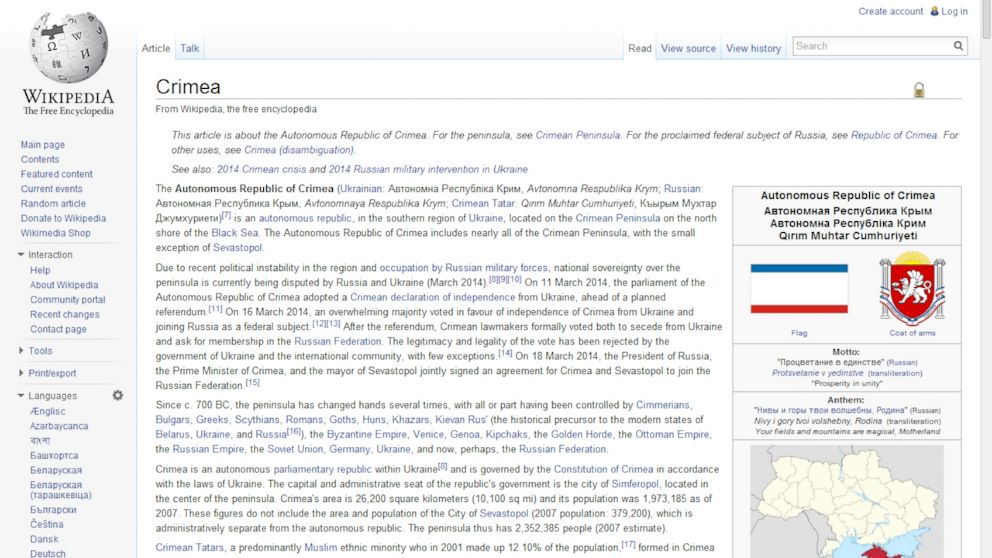Wikipedia Is Battleground for Crimea War of Words
Online encyclopedia struggles to maintain objectivity amid political tensions.

Mar. 19, 2014— -- A few days ago, Wikipedia described Crimea as an “autonomous parliamentary republic within Ukraine.” Then, someone fired back, noting, “the Nationality of Crimea is disputed.” On Tuesday, the “Republic of Crimea” broke free with a brand new Wikipedia page in addition to existing "Crimea" entry.
Amid Cold War-style tensions between the West and Russia over the sovereignty of Crimea, there is a war of words on the Internet, and Wikipedia is on the front lines.
Following Russia's annexation of Crimea Sunday after a referendum that the West deemed “illegal,” Wikipedia editors have been wary of appearing to take sides on the issue.
Read More: White House on Crimean Referendum | Post-Vote Change in Crimea
The situation has been documented on Wikipedia's Wiki Talk section. And now, Wikipedia has locked its Crimea entry after editors said the situation was “getting out of hand.” The revision history for “Crimea” showed the entry edited more than 500 times in March alone.
Wikipedia spokesman Jay Walsh could not confirm when the article was locked, but said it was not protected six months ago.
“As protests mounted, people were vandalizing the article,” he said. “They were folks who come to the page without the intent of trying to improve the page.”
Wikipedia entries routinely can be created and edited by any user with access to the Internet. Those posts and edits are then reviewed and responded to by a team of around 80,000 volunteers across the world. When editors can't agree on a certain topic or sentence, they can seek dispute resolution by requesting a third opinion or even formal mediation by Wikipedia administrators. But resolutions aren't always immediate and the final updates could take days to appear, affecting the millions of Internet searchers who use Wikipedia as a reliable source of information. The entry on Crimea alone reached 360,000 page views a day in early March.
Many of the changes made to the Crimea entry in the past few days have been minor edits to eliminate disambiguation, but others have been corrections made to try and maintain objectivity and follow the editing guidelines set out by the world’s largest online encyclopedia.
Despite Wikipedia’s warning that its Talk Pages are “not a forum for general discussion of the article's subject,” but are instead for users to discuss improvements to the entry, editors have been overtly engaging in the political debate.
One Talk section titled, “Should we change the name to Republic of Crimea yet?” exemplified the running commentary since the weekend. In it, one editor declared hesitation about naming regions as independent until an “official document or declaration, such as a constitution” was produced, while another argued a name change wasn’t necessary because of the new "Republic of Crimea" page.
Other discussion threads titled, “Isn’t the name Russian propaganda,” and “fantasy,” claim the entry is still clearly skewed in Russia’s favor, a claim that other users denied.
“This article must have been written by Vladimir Putin- it is a Russianized version and is fallacious arguments and reasoning. Simply it is bunk!” an anonymous commenter wrote.
"That's funny because someone else just accused me of keeping the article "westernized'" replied another user, JOJ Hutton. "Clearly no one is going to be happy until it's either all one way or the other."
Wikimedia maintains it has no direct editorial involvement in the article, and said the page doesn’t even have a heavy level of dispute compared with some other entries, usually political. Despite this, Walsh said, the number of edits made to the page in one month is significant, but “appropriate, given this is an unfolding story.”
“Wikipedia wants to be inclusive. It tries to reflect a wide range of perspectives,” said Walsh. "This is a complicated one. The objective is to try and include a range of different perspectives on the issue.”



